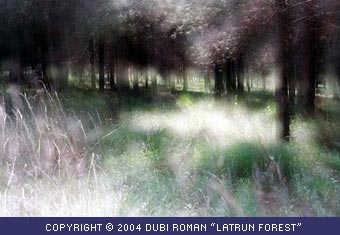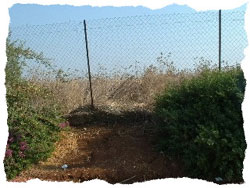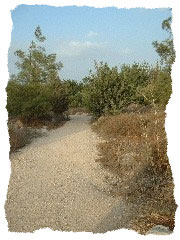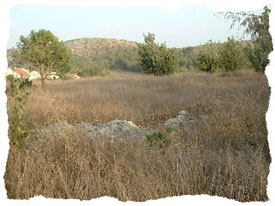 Well,
here we are again, my friends. By the time you read this, another year will
be upon us. There were woeful delays with September’s and December’s
issues for which I can do nothing but apologize. Yet, my contributors were
infinitely patient, encouraging and remarkably kind. Without a doubt, this
issue—A Tribute to Israel—is very much dedicated to all my contributors
and friends.
Well,
here we are again, my friends. By the time you read this, another year will
be upon us. There were woeful delays with September’s and December’s
issues for which I can do nothing but apologize. Yet, my contributors were
infinitely patient, encouraging and remarkably kind. Without a doubt, this
issue—A Tribute to Israel—is very much dedicated to all my contributors
and friends.
On the Contents Page, the photo is by Henry Miller. The title of the photo
is “Moslem Quarters/To Ateret Cohanim Yeshiva.”- A loving gift
from my friends, Arthur and Elayne Edelstein. Thank you for reading our
journals, enjoy. ~Mia:editor@tryst3.com
Editor's Note: Photos below are few of the landscape scenes around Rochelle's home.
How it Looks from Here by Rochelle Mass
I see my neighbor’s son in uniform. I wonder if a stranger would understand my amazement. He’s just been called up; Yaron is 18, just finished high school, just become a soldier. The uniform lies flat and smooth. No signs of wear, no marks of struggle, not even the stains of summer.
Would a stranger understand why, the next week, on Yaron’s first army leave home, I’m amazed again. He’s mowing the lawn – yes, he’s done that for years, but this time, bare-chested, in his army pants and army boots - he’s a soldier now. I can see his shoulders have thickened in just one week. Of course, he could wear his tattered shorts, but he’s a soldier now, and wants the neighbors to know it.
 We’ve
lived next door for 8 years. Yaron used to toss the ball with the kid across
the street who also is a soldier now. Both are home this weekend; their
voices carried new energy, both sounded serious and proud as they sat on
the porch last night as they talked way into the night.
We’ve
lived next door for 8 years. Yaron used to toss the ball with the kid across
the street who also is a soldier now. Both are home this weekend; their
voices carried new energy, both sounded serious and proud as they sat on
the porch last night as they talked way into the night.
***
I’ve lived and worked in Israel for 30 years. My husband and I came
with our two young daughters in 1973, the summer before the Yom Kippur War,
and settled in a kibbutz in the Jezreel Valley. We were all born in Canada,
all born in the prairies. You had to believe in flat to like that land.
It stretched into an endless belt that was the bread basket of Canada. Nothing
breaks the horizon, just the smell of harvest. A harsh winter spreads over
most of the year, only leaving a month or two for summer that invades with
heavy heat and clouds of mosquitoes. I learned to be tough there, to respect
the wind, to survive the rip of that chill. “I believed the wind rules…
giving me no choice but to bend, invent new posture.” 
Even though I’ve lived in Israel as long as I’d lived there, I’m still new to many things. It’s a complex place. This slim land fits twice into Vancouver Island. (If I were American, I’d probably compare Israel to Rhode Island.) I still listen very closely to Hebrew, watch how the language of prayer has been brought to everyday needs, how biblical phrases merge with the anxious pace of this land, how Hebrew exposes the raw side of the 56 years of this young country, how it creates phrases that unite opposites, bear solace, sing euphoria and – more than ever – confess concern that this place may not be here forever.
Writing in Israel, whether in Hebrew or other languages, begs to transcend linguistic confines as one person tells her story. If you read carefully, you hear how the monologue becomes the voice of many, how it turns this person’s pain into common hopes. It may sound like cultural hysteria, or may be as audible as an empathetic chorus. Borders are tested, memories are stacked, time is collected. Experience is accumulated, then often discarded.
As testimony of the immigrant, it is the admission of an individual who has willingly or unwillingly left a birthplace, yet has not entirely adopted the new status. You also find the tenacious search of one who was born in Israel yet yearns for the foreign, who confronts the unknown.
Writing from Israel is often liberal, usually lyrical, ever acute. Wielding
craftsmanship independently, images are placed in the cultural scenery of
the country. This is a return to origins, leading to a primal, healing place.
It becomes a regional way of speaking: the text plunges unexpectedly into
narrative, expands tragic events of the day. 
***
The neighbor’s boy Yaron is returning to his army base this morning. Swinging a full khaki kit bag over his shoulder, he pulls at his collar then walks down the road. There’s so much I want to ask him. Maybe the next time he’s mowing the lawn, I’ll wave, lean over and ask – “Are you afraid?” but I know that wouldn’t be right. I’ll just reach over, touch his face and tell him how strong he looks.
…………
Excerpts from the above are taken from:
The Introduction to Israeli writers written by Rochelle Mass in
The Poem & The World, Book Four
Seattle Sister-Cities Poetry Series, An International Anthology -
poetry from Beer Sheva, Israel; Bergen, Norway; Ceru City, Phillipines;
Seattle, USA, 2002.
* The Mind of Winter, the closing poem in The Startled Land, by Rochelle Mass, Wind River Press, 2003 was awarded first prize in the Reuben Rose Annual Poetry Contest, 2002.